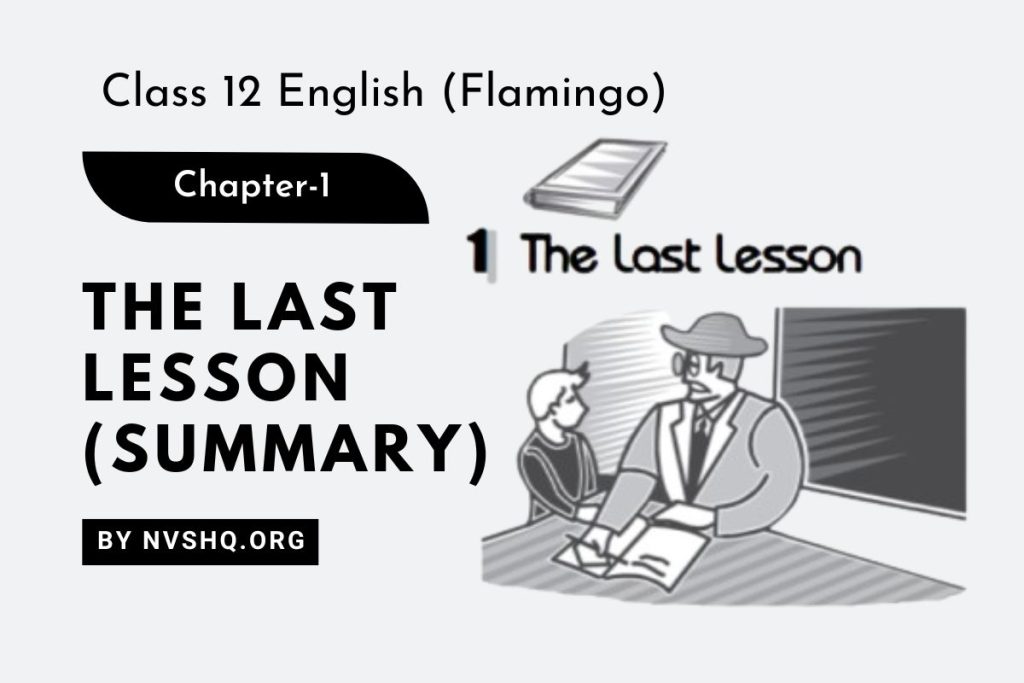The Last Lesson Summary: In this article, we have given the summary of The Last Lesson, which is the first story of English Reader Flamingo for class 12.

Summary of The Last Lesson
The last lesson is the first chapter of the flamingo book. Written by Alphonse Daudet who is a french novelist. The chapter setting takes place in the time when France and Prussia were fighting a war and France was defeated by Prussia (now Germany, Poland and a few parts of Austria). The French district of Alsace and Lorraine after the defeat of France was passed to Prussia. An order comes from Berlin according to which the teaching of the French language was discontinued and German was introduced in these two parts. All the French teachers were ordered to vacate the position. The narration of the story takes place by Franz who was a student of M. Hamel. The day when is the last lesson of M.Hamel is emotional for Franz though he never took his French lesson seriously.
The author explores the theme of war and the impact it has on the lives of people. War not only has its impact on the political or geographical front but the common people are most affected by it. A war uproots the life of common people and to how much extent to it affects the people is explored in the story. The second major theme is the importance of knowing one own language. Linguistic identity is explored through the boy Franz who suddenly feels sorry for himself for not learning his mother tongue which was French.
The story starts with Franz who was running late for his school and has also forgotten to learn his participles which were his homework given by M. Hamel. On his way to school, he sees that a crowd has gathered in front of the bulletin board. He remarks that this bulletin board is the carrier of all the bad news of the district and imagines what bad news this board has brought now. But as he was getting late for school he ignores the board and runs towards his school.
As soon he reaches there he notices that something was out of place because usually there was a lot of bustle going on and children would be reciting lessons but that particular day everything was quiet as a Sunday morning. Through the window, he saw his teacher M. Hamel with his scale. He goes on to say that he always used to take advantage of the ongoing commotion to enter the class without getting noticed but today he could not do that. He went into the classroom thinking he would be scolded by his teacher but to his surprise, he asked him very kindly to come and take a seat.
Now after taking his seat Franz notices that M.Hamel was wearing his green coat, frilled shirt and black cap which was reserved for only special days. Now he notices that in the back benches along with them, the village people were also sitting and everyone was looking sad. Suddenly M.Hamel announces that this is his last French class in a very sad and grave tone. An order has come from Berlin that from now only German will be taught in Alsace and Lorraine. Upon hearing these words Franz describes these words to be thunderclaps.
He was too shocked upon releasing that this would be his last French lesson. The poor boy started feeling guilty because he never took his language seriously and he releases that this is why all the villagers have to come to give respect to M. Hamel and to their last lesson in French language. The boy says that a few moments ago these books in his bag seemed like a burden but now they appear to him like an old friend upon whom he doesn’t want to give up. The villagers and Franz now release the importance of their native language.
As soon as the realisation that he won’t be able to study under M. Hamel hit Franz hard although he used to hate him. While all these things are going on in his mind his name is called by M. Hamel to recite his lesson but he was not prepared for it and was feeling very guilty about it. He was careless and never took his language seriously. To his surprise, M. Hamel does not scold him and tells everyone present there that they all took their language for granted.
He blames himself too for not putting all his efforts to teach his pupils. He blames the parents of these children because instead of sending them to school they used to send these children to mills to work so that little money can be made. And children are also blamed who never taking language seriously. He further says how beautiful and logical the French language is in the whole world. The love and patriotism of M. Hamel towards his French language are clearly shown here. After the reciting portion ended M. Hamel took out new copies for everyone which looked like little flags floating around everywhere in the classroom.
All the pupils were sincerely doing their work, there was pin-drop silence in the class. Franz was also understanding each and every word of M. Hamel. He notices a pigeon on the roof and wonders if they too will sing in German now. The reference is made to the freedom these birds and animals enjoy but humans are deprived of this freedom because of war. Franz notices that M.Hamel was himself very sad and disappointed about leaving the place and his identity.
All at once the clock strikes twelve and M.Hamel tries to speak but chokes on his words and turns to the blackboard and writes ‘ Vive La France’ and gestures to the class and asks them to leave the class and the school is dismissed.






